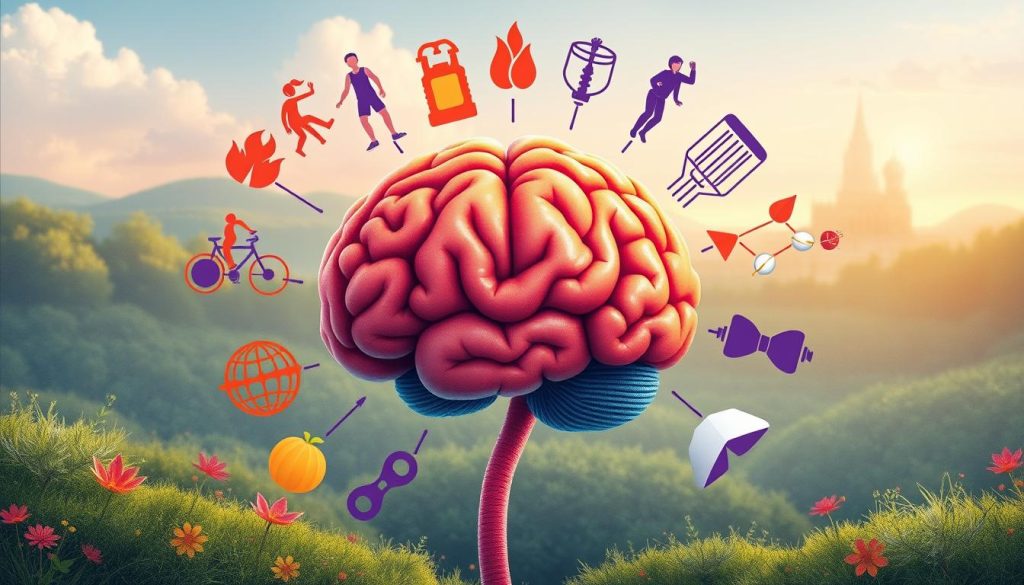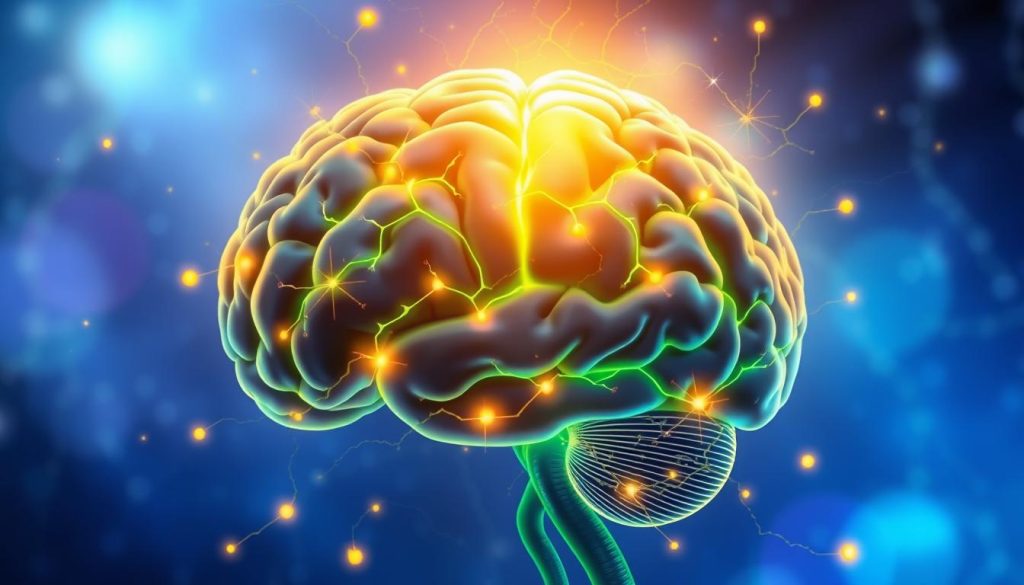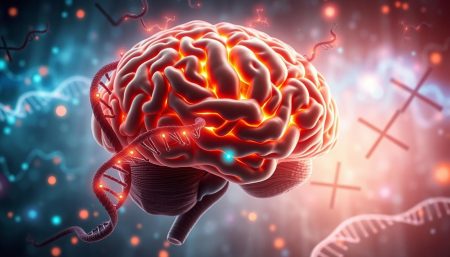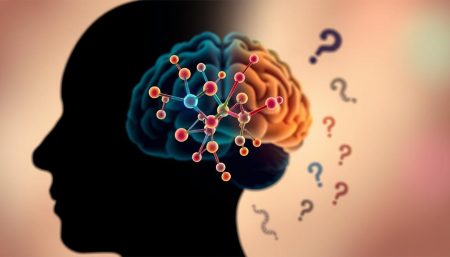Keeping our minds sharp as we age is a big concern for many. Alzheimer’s disease is a major challenge, affecting many families and individuals. To fight against Alzheimer’s, we need to make lifestyle choices that boost cognitive health and help us stay sharp. This article will explore seven ways to protect our minds and bodies from Alzheimer’s Disease.
Key Takeaways
- Incorporating a balanced diet is crucial for Alzheimer’s prevention.
- Regular physical activity can bolster cognitive health.
- Keeping your mind engaged is essential to maintain peak cognitive health.
- Social interactions can have a protective effect against cognitive decline.
- Quality sleep and stress management are important in reducing Alzheimer’s risk.
Understanding Alzheimer’s Disease and Brain Health
Alzheimer’s disease is a serious brain disorder that mainly hits older people. It causes memory loss, trouble with thinking, and doing daily tasks. Keeping the brain healthy is key to fighting Alzheimer’s and keeping our minds sharp.
The Basics of Alzheimer’s Disease
Alzheimer’s is often linked with dementia. It happens when the brain builds up harmful stuff called beta-amyloid plaques and tau tangles. These block signals between brain cells. At first, it might just be small memory slips. But it can get worse, affecting how we talk, make decisions, and feel emotions.
Importance of Maintaining Brain Health
Keeping the brain in top shape is crucial to avoid Alzheimer’s. Doing brain-stimulating activities like puzzles, reading, and learning new things is important. Eating right, exercising regularly, and getting enough sleep also help keep the brain healthy.
How Do You Prevent Alzheimer’s Disease with Diet?
An effective Alzheimer’s disease prevention diet focuses on brain health nutrition. It includes foods rich in essential nutrients that protect the brain. Knowing which foods to eat and avoid is key to maintaining brain health.
Studies show that diet affects Alzheimer’s disease risk. Eating less saturated fat and more fruits, vegetables, whole grains, and lean proteins is good. This diet helps keep the brain sharp and healthy.
Focus on foods high in antioxidants, omega-3 fatty acids, and vitamins. These are crucial for both physical and mental health. Here are some key nutrients and foods for an Alzheimer’s disease prevention diet:
- Oily fish like salmon and mackerel, which are high in omega-3 fatty acids
- Berries and dark-skinned fruits which are great sources of antioxidants
- Leafy green vegetables such as spinach and kale, high in vitamins and minerals
- Nuts and seeds, for their vitamin E and healthy fats content
- Whole grains, which contribute to overall vascular health and are integral to brain health nutrition
Good brain health through nutrition means adding good foods and avoiding bad ones. Foods high in cholesterol and saturated fats can increase Alzheimer’s risk. They can lead to beta-amyloid plaques in the brain, a sign of the disease.
| Beneficial Nutrient | Recommended Foods | Avoid |
|---|---|---|
| Omega-3 Fatty Acids | Fatty fish, flax seeds | Red meat, heavy cream |
| Antioxidants | Berries, dark chocolate | Processed foods, sugary snacks |
| Vitamins (A, C, E) | Nuts, citrus fruits, leafy greens | Margarine, high-fat dairy products |
| Whole Grains | Brown rice, whole wheat pasta | White bread, pastries |
Following an Alzheimer’s disease prevention diet is part of a larger plan to lower Alzheimer’s risk. By focusing on brain health nutrition, people can improve their mental abilities. This may help delay or prevent Alzheimer’s disease.
Physical Exercise and Its Effects on Cognitive Function
Regular physical exercise is key to keeping our brains sharp. It helps prevent and delay Alzheimer’s disease. Exercise makes our brains work better and keeps them healthy.
Research shows that exercise boosts brain health. It increases blood flow and helps grow brain cells. This protects our brain cells and helps create new connections.
Let’s explore how different exercises affect our brains:
| Type of Exercise | Benefits for Cognitive Function |
|---|---|
| Aerobic Exercise | Improves blood circulation and is linked to increased hippocampal volume, which is vital for memory formation. |
| Strength Training | Associated with enhancements in executive function and memory, essential for problem-solving and planning. |
| Balance and Flexibility Training | Helps improve spatial awareness and reduces fall risk in seniors, indirectly supporting overall brain health. |
| Mixed-Activity Programs | Combines elements of strength, endurance, and flexibility for comprehensive cognitive benefits. |
To prevent Alzheimer’s, mixing different exercises is best. It keeps workouts fun and helps target all brain functions.
Adding physical activities to our daily lives is vital. It’s not just for health; it’s a strong defense against Alzheimer’s. It helps us stay mentally sharp for longer.
Managing Risk Factors for Alzheimer’s Disease
Many people worry about Alzheimer’s disease. It’s important to take steps to manage it. By understanding and reducing risk factors, we can improve our brain health. Here, we look at key risk factors and how to lower them through lifestyle changes.
Identifying Your Personal Risk Factors
Knowing your health is key to finding Alzheimer’s risk factors. Some risks, like age and family history, can’t be changed. But, risks tied to lifestyle, like heart health and exercise, can be managed.
Strategies for Risk Reduction
To manage risks, we need a plan. Focus on lifestyle changes that help your brain. This includes exercise, a healthy diet, mental challenges, and staying social.

- Eat foods that are good for your brain, like omega-3s and antioxidants.
- Exercise regularly to keep your heart healthy and blood flowing well.
- Do puzzles and learn new things to keep your mind sharp.
- Get regular health checks to watch your blood pressure and sugar levels.
By making these lifestyle changes, we can lower our risk of Alzheimer’s. These changes also improve our overall health and well-being.
| Risk Factor | Lifestyle Changes | Expected Benefit |
|---|---|---|
| High Blood Pressure | Regular exercise, low-salt diet | Lowered risk of cardiovascular diseases, improved brain health |
| Obesity | Healthy diet, increased physical activity | Weight loss, reduced inflammation |
| Social Isolation | Community participation, maintaining social ties | Enhanced cognitive reserve, emotional support |
By changing our lifestyle, we can fight Alzheimer’s disease. This shows how important it is to make informed lifestyle choices for our brain health.
Importance of Mental Stimulation for Memory Care
The role of mental stimulation in keeping our minds sharp is huge. It helps with memory care and can even prevent Alzheimer’s. This part talks about fun ways to keep your brain active and healthy.
Mental stimulation means doing things that make your brain work hard. It helps you think better, solve problems, and learn new things. Studies show it makes your brain stronger and can help fight Alzheimer’s.
- Crossword puzzles and brain teasers that challenge word skills
- Strategy games, including chess or bridge, that require critical thinking and planning
- Learning a new language or instrument, activities known for increasing brain plasticity
- Attending lectures or engaging in discussions on new topics to foster continual learning and curiosity
These activities are not just fun; they help keep your brain healthy as you age. Adding them to your daily life is a smart move. It helps with memory care and makes life more enjoyable.
As we learn more about Alzheimer’s, we see the value of keeping our minds active. Doing mentally challenging activities is key to staying sharp and independent. It’s not just good; it’s essential for a healthy mind.
Lifestyle Changes to Support Brain Health
Making lifestyle changes can greatly improve brain health and overall well-being. By adding routines that boost social interactions and reduce stress, you can live a brain-friendly life. Let’s see how to make these changes part of our daily lives.
Maintaining Social Connections
Keeping up with social connections is key for brain health. Regular social activities can improve thinking skills and lower the risk of mental decline. Join clubs, go to community events, or meet friends regularly to stay connected and active.
- Join local interest groups that encourage interaction.
- Participate in volunteer activities; these can provide a sense of purpose and community engagement.
- Schedule regular calls or meetings with friends and family.
Stress Management Techniques
Managing stress is vital for brain health. Chronic stress can hurt thinking skills and age the brain faster. Adding stress-reducing activities to your life can help prevent these problems.
- Practice mindfulness and meditation to enhance mental clarity and relaxation.
- Engage in regular physical exercise, which is not only good for the body but also for the mind.
- Allocate time for hobbies and interests that bring joy and relaxation.
| Technique | Benefits | Frequency |
|---|---|---|
| Meditation | Reduces stress, improves focus, and supports emotional health | Daily |
| Physical Exercise | Enhances brain function, reduces anxiety and stress | 3-5 times a week |
| Social Interaction | Improves cognitive function and reduces risk of depression | Weekly |
Adding these lifestyle changes to your routine can greatly improve brain health and life quality. By staying socially active and managing stress well, you’re taking big steps towards keeping your brain healthy and preventing decline.

Early Detection and the Role of Regular Check-Ups
Early detection of Alzheimer’s disease is key to managing it well. Regular medical check-ups help catch early signs of cognitive decline. This proactive approach is vital for keeping cognitive health in check.
Regular check-ups are crucial. They allow doctors to do detailed evaluations and cognitive tests. These tests check memory, problem-solving, and other mental skills.
These check-ups help spot symptoms that might be missed in everyday life. They are essential for early detection.
Regular visits to the doctor also build a strong relationship with healthcare providers. This ensures ongoing care and a deep understanding of one’s health. Here are some key benefits:
- Early diagnosis can lead to early treatment, potentially slowing the progression of Alzheimer’s.
- Enhanced monitoring allows for adjustments in treatment plans as needed, optimizing patient care.
- Family members are better prepared for future needs and care planning.
Early detection Alzheimer’s disease is more than just finding the disease. It’s about understanding a person’s health fully. This knowledge is crucial for planning and ensuring a good quality of life.
| Benefit | Details |
|---|---|
| Improved treatment outcomes | Early interventions have been shown to significantly manage symptoms better. |
| Preventative strategies | Customized health strategies can be implemented to slow cognitive decline. |
| Empowered decision-making | With knowledge of their condition, patients and families can make informed decisions about care options. |
In conclusion, focusing on early detection Alzheimer’s disease through regular medical check-ups is vital. It’s not just about prevention but also about maintaining brain health and improving quality of life. As medical knowledge grows, the importance of early detection and regular check-ups becomes even clearer.
Understanding Caregiver Support and Resources Available
Dealing with Alzheimer’s caregiving can feel overwhelming. But, with the right caregiver support and Alzheimer’s resources, it becomes easier. Caregivers can find help from local groups and online tools. These resources are key to giving the best care.
Support Groups for Caregivers
Support groups are vital for caregivers. They offer emotional support and practical advice. Here, caregivers share their stories and learn from others facing similar challenges.
Being part of a caregiving network helps reduce stress and feelings of loneliness. It also leads to discovering new ways to cope and find resources.
Building a Caregiving Network
A strong caregiving network is crucial for support. It includes family, friends, and professionals. Each plays a key role in caregiving.
Having access to reliable Alzheimer’s resources is essential. The National Institute on Aging’s webpage on getting help with Alzheimer’s caregiving is a great place to start. It offers guidance on home care and legal help.
| Type of Support | Benefits |
|---|---|
| Emotional | Reduces stress, prevents caregiver burnout |
| Practical | Assistance with caregiving tasks, resource management |
| Professional | Access to specialized knowledge and skills |
| Social | Decreases isolation, enhances caregiving network connections |

Support systems are crucial in Alzheimer’s caregiving. By joining support groups and building a strong network, caregivers can better handle caregiving challenges. This improves care quality and enhances life for both caregivers and their loved ones.
Reviewing Treatment Options for Alzheimer’s Disease
Medical science is making progress in fighting Alzheimer’s. This is key for cognitive health management. Treatments now range from medicines to therapies and even alternative methods. Each is designed to ease symptoms and maybe slow the disease’s spread.
Medicines can help with symptoms and are often used with therapies. These therapies help keep the mind sharp. Researchers are always looking for new treatments. Right now, drugs like cholinesterase inhibitors and memantine help by balancing brain chemicals.
Therapies like cognitive behavioural therapy and memory games are key. They help keep the mind active and improve life quality. Therapists suggest doing puzzles, memory games, and exercises to keep the mind sharp.
Alternative treatments, like dietary supplements and herbal remedies, are being studied. Some research shows they might help the brain. Mindfulness practices, like yoga and meditation, are also recommended. They help by reducing stress and improving focus.
| Treatment Type | Primary Purpose | Examples |
|---|---|---|
| Pharmaceuticals | Manage symptoms, improve neurotransmitter activity | Cholinesterase inhibitors, Memantine |
| Therapeutic | Cognitive retention, mental activity stimulation | Cognitive Behavioral Therapy, Structured Memory Exercises |
| Alternative Approaches | Supplement conventional treatment, manage stress | Mindfulness, Dietary Supplements |
New research and trials give us hope. But, it’s important to have realistic hopes and support for cognitive health management. It’s crucial to talk to doctors before starting any treatment. This ensures the treatment fits the patient’s needs and lifestyle.
Staying Informed: Research Updates on Alzheimer’s Prevention
It’s crucial to stay updated on Alzheimer’s research updates for those interested in preventing and managing this disease. Recent breakthroughs in genetic research Alzheimer’s prevention have opened new doors. They are leading to innovative preventive measures and treatments.
Emerging Research and Studies
Research is always changing, showing how genetics and lifestyle can lower Alzheimer’s risk. Studies are finding genes that predict who might get Alzheimer’s and how they might respond to treatments.
Role of Genetics and New Discoveries
Genetic research Alzheimer’s prevention has changed how we see Alzheimer’s. Scientists are looking into gene therapy as a way to prevent it. This research helps create treatments that fit each person and improves how we screen and detect Alzheimer’s early.

| Research Focus | Key Findings | Potential Impact |
|---|---|---|
| Gene Identification | Isolation of genes linked to Alzheimer’s | Enhanced genetic screening and tailored interventions |
| Therapeutic Trials | Testing new drug therapies that target genetic paths | Potential for halting or reversing cognitive decline |
| Lifestyle Correlations | Studies on diet, exercise, and cognitive engagement | Development of holistic prevention plans incorporating genetics and lifestyle factors |
Grasping the details of Alzheimer’s research updates and the advancements in genetic research Alzheimer’s prevention is key for future medical breakthroughs. These discoveries offer hope for a better life for those at risk. They also suggest a future where Alzheimer’s might be preventable.
Using Supplements and Vitamins for Cognitive Health
Looking into Alzheimer’s prevention, we must examine cognitive health supplements and vitamins for brain health. These are popular among those wanting to keep their minds sharp as they get older.
Vitamins like B12, D, and omega-3 fatty acids are often talked about for brain health. Research shows they might help keep the brain working well and slow down cognitive decline. Many doctors recommend adding these vitamins to your daily routine to fight off brain decline symptoms.
But, it’s important to think about how well and safely these cognitive health supplements work. Not every supplement is the same, and some might not be safe for everyone, especially if you’re taking other medicines.
| Supplement | Benefit | Recommended Dosage | Considerations |
|---|---|---|---|
| Vitamin D | Supports brain health | 600 IU daily | Check levels before supplementing |
| Omega-3 Fatty Acids | Promotes nerve function | 1000 mg daily | Derived from fish oil, may need alternatives for allergies |
| Vitamin B12 | Helps in nerve regeneration | 2.4 mcg daily | Essential for older adults |
In conclusion, while vitamins for brain health and cognitive health supplements can help, they’re just part of the solution. They should go hand in hand with exercise, a healthy diet, and mental challenges. Always talk to a doctor before starting any new supplements to make sure they’re right for you.
Creating a Preventative Routine Tailored to Your Needs
Starting a preventative routine for Alzheimer’s means understanding your unique health. A personalized prevention plan fits your health history, genes, and lifestyle. It’s not just about following general health tips.
This method makes prevention easier and more effective. It helps lower the risk of Alzheimer’s. We’ll show you how to create a plan that’s right for you.
- Assess your current health and family medical history.
- Look at your lifestyle, like diet, exercise, and brain games.
- Find and manage risk factors.
Starting a preventative routine for Alzheimer’s might seem hard. But, with the right help, it’s doable. Making strategies fit your life makes them work better and last longer.
| Component | Details | Personalized Adjustments |
|---|---|---|
| Diet | Rich in antioxidants, low in processed foods | Include favorite foods that meet dietary criteria |
| Exercise | Minimum 150 minutes per week of moderate intensity | Choose preferred activities like dancing, swimming, or yoga |
| Mental Stimulation | Engage in puzzles, learning a new skill | Select activities that are enjoyable and challenging |
Adding feedback to your personalized prevention plans is important. Regular health checks and community support help adjust your plan. This keeps it relevant to your changing health and preferences.

Being consistent is crucial in any prevention plan. Even when life changes, keeping up with brain health is important. With a tailored plan, everyone can take steps to prevent Alzheimer’s. This improves their life and well-being.
The Power of Sleep in Alzheimer’s Prevention
The role of sleep in Alzheimer’s prevention is now widely accepted. Quality sleep boosts brain health, lowering Alzheimer’s risk. It supports brain functions and clears toxins that harm the brain.
Improving sleep quality boosts brain power and fights Alzheimer’s. To improve sleep, we must understand the sleep cycle’s stages and their effects on the brain.
Understanding Sleep Cycles and Brain Function
The brain goes through different sleep stages, like light sleep and REM sleep. Each stage is important for brain health. For example, deep sleep helps with memory and removing toxins, key for Alzheimer’s prevention.
Studies, like those on the Alzheimer’s Society website, show deep sleep clears beta-amyloid plaques. These plaques are a sign of Alzheimer’s.
Tips for Improving Sleep Quality
To better your sleep, make some lifestyle and environment changes. These can greatly improve brain health. Here are some tips for better sleep:
- Go to bed and wake up at the same time every day, even on weekends.
- Make your sleep area quiet and dark with blackout curtains and white noise machines.
- Stay away from caffeine and stimulants before bedtime to help you relax.
- Exercise regularly, but not right before bed.
| Strategy | Benefit |
|---|---|
| Consistent Sleep Schedule | Regulates the body’s clock, improving overall sleep quality and duration. |
| Environment Optimization | Minimizes disruptions that can inhibit deep sleep phases crucial for brain detoxification. |
| Caffeine Regulation | Prevents sleep disturbances from stimulants that can impair sleep quality. |
| Appropriate Physical Activity | Enhances deep sleep stages that facilitate cognitive repair mechanisms. |
Improving sleep quality is key for brain health and Alzheimer’s prevention. By following these tips, you can improve your sleep. This helps protect your brain and boosts your overall health.
Conclusion
As we wrap up our detailed look at Alzheimer’s disease prevention, it’s key to remember the value of maintaining cognitive function. This approach is vital for our health. We’ve seen how important it is to tackle this disease with a variety of methods. These include changing our diet, staying active, and keeping our minds sharp.
These strategies show how big of a difference we can make by choosing wisely. Adding brain-boosting foods to our meals, exercising to get blood flowing to our brains, and solving puzzles can all help. Each action we take is a step towards keeping our minds sharp and our brains healthy.
- Diet rich in antioxidants and anti-inflammatory foods
- Regular physical exercise tailored to individual capability
- Cognitive exercises to strengthen brain connections
- Social engagement to reduce stress and stimulate mental activity
Learning and being proactive about brain health can really help. Encourage your family and friends to join in. Together, we can build a community focused on keeping our minds sharp and preventing Alzheimer’s. Let’s make these strategies a part of our lives, not just a one-time effort. This way, we can keep our minds active and vibrant for years to come.
Share Your Story
In the vast Alzheimer’s disease community, many share stories of strength, new ways to prevent it, and caring for loved ones. By sharing personal experiences, people find relief and help others. We encourage you to share your story and learn from others who face similar challenges.
Your advice on managing risks, making lifestyle changes, or caring for someone with Alzheimer’s can help a lot. The stories we share build understanding, spark empathy, and give our community strength. By sharing your experiences, you offer hope to others.
Your story adds to our knowledge and supports our mission to help those with Alzheimer’s. We invite you to connect with our resources, share your strategies, and talk about your successes and struggles. Every story we share moves us closer to understanding and fighting Alzheimer’s disease. Together, we can build a stronger community and a brighter future without Alzheimer’s.
FAQ
Q: What proactive measures can reduce the risk of Alzheimer’s disease?
A: To lower Alzheimer’s risk, eat a healthy diet and exercise regularly. Also, do brain-stimulating activities, manage stress, and stay connected with others. Get enough sleep and see your doctor for check-ups. Making lifestyle changes early on is important.
Q: How does diet influence cognitive health and Alzheimer’s prevention?
A: Diet is key for brain health. Foods with omega-3s, antioxidants, and vitamins help. Avoid foods high in bad fats and sugar. Eating whole foods, lean proteins, and fruits and veggies is best for your brain.
Q: Why is physical exercise important for preventing Alzheimer’s disease?
A: Exercise boosts brain health by improving blood flow and reducing inflammation. It also helps grow brain cells. Regular exercise can help keep your memory sharp.
Q: What are the known risk factors for Alzheimer’s disease?
A: Risk factors include age, genetics, and family history. Lifestyle factors like heart health, diabetes, and smoking also play a part. Knowing your risks helps you take action to prevent Alzheimer’s.
Q: How does mental stimulation contribute to memory care and Alzheimer’s prevention?
A: Mental activities like puzzles and learning new things strengthen brain connections. This can help delay Alzheimer’s symptoms. It’s good for your memory.
Q: What lifestyle changes can support overall brain health?
A: For brain health, stay connected with others and manage stress. Prioritize sleep and eat well. A balanced lifestyle supports your brain’s health.
Q: How significant is early detection in managing Alzheimer’s disease?
A: Early detection is crucial for managing Alzheimer’s. It allows for timely treatment and planning. Regular health checks can catch symptoms early.
Q: What support and resources are available for Alzheimer’s caregivers?
A: Caregivers can find support groups, educational materials, and networks. These offer emotional support and practical advice. They help caregivers feel connected and supported.
Q: What treatment options are currently available for Alzheimer’s disease?
A: Treatments include medications and non-pharmacological methods like cognitive therapy. While there’s no cure, these options aim to improve quality of life and slow decline.
Q: Can taking supplements and vitamins improve cognitive health and prevent Alzheimer’s?
A: Some supplements and vitamins may help brain health. But, their safety and effectiveness vary. Always talk to a doctor before starting supplements, as evidence on preventing Alzheimer’s is mixed.
Q: What advances are being made in Alzheimer’s prevention research?
A: Research focuses on lifestyle, genetics, early detection, and new treatments. Staying updated on these studies helps in applying the latest prevention strategies.
Q: How can I create a preventative routine tailored to my needs?
A: Start by assessing your health, risks, and lifestyle. Personalize your routine with diet, exercise, and mental activities. Consult with healthcare professionals to tailor these strategies for you.
Q: Why is sleep important in Alzheimer’s prevention?
A: Sleep is crucial for brain health. It helps clear out toxins and supports memory. Getting quality sleep is key to preventing Alzheimer’s.


















